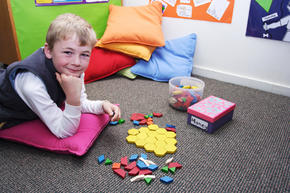
Five minutes after giving the math assignment, Maria raises her hand to show she’s finished. Other students will need a lot more time (and often some help from the teacher) in order to complete the assignment. What will Maria do? Best practice dictates that if she’s mastered the current set of problems, she shouldn’t simply be assigned more of the same work. How can you challenge her and still make yourself available to help your pupils who are struggling?
One idea to try is a math independent study. Independent studies allow learners to delve more deeply into a specific area of interest, with little more than facilitation on the part of the teacher. In my classroom, I assign my highest math pupils a choice of several independent study projects. Here are a few ideas:
Math Adventure Book
Have kids check out several Math Adventure books from the library. Here are a few good examples: Sir Cumference and the First Round Table, Once Upon a Dime, and Sir Cumference and the Sword in the Cone. Have pupils write their own math adventure book to teach a math concept of their choice (look through the math textbook for ideas!). After they have reviewed their chosen books and the textbook, give them these steps to follow:
- Write a rough draft of your story (students can use math textbooks for help with the concept if necessary).
- Edit your story.
- Create and illustrate a book using your own drawings or pictures from the computer.
- Read your book to another student.
Wacky, Weird, Word Problems
Pupils can create a book of weird word problems. Here are the steps:
- Research weird and wacky facts to use in math word problems. For example, leeches suck blood up to eight times their body weight in one sitting. You can use the Internet or books you find in the library.
- Create a fun and interesting word problem with each fact.
- You will need at least 50 problems to make a full book.
- Type up your problems and staple them together to make a book. Be sure to include an answer key!
- Choose several of your problems for classmates to solve.
Architecture Activity
Ask kids to design a floor plan for their dream home. Follow these steps:
- Brainstorm some ideas for rooms you’d like to have in your dream home.
- Measure some rooms in your own home so you can get an idea of how big you’d like the rooms to be in your new home.
- Get some graph paper (you may need to tape several sheets together by the end of this project) and create a scale floor plan of your dream home. Include the scale (such as 1 cm = 2 feet) at the bottom, and label each room. If your home has more than one floor, create a separate plan for each level.
- Present your floor plan to the class.
Ancient Number Systems
Research ancient number systems (Egyptian, Mayan, etc.) Choose one and create a lesson that will teach it to the rest of the class. Your lesson must include the following:
- PowerPoint presentation on your chosen number system (at least 10 slides – preferably more!). This should include some in-depth research.
- Classroom activity that classmates will complete individually or in groups.
- Make a worksheet that your classmates can complete for homework.
Each of these options includes work that can be accomplished independently, as well as the opportunity to share it with an audience at its conclusion. What follows are more lesson plans that can easily be modified to form an independent study.
Independent Study Lesson Plans from Lesson Planet
The One Million Dollar Project
This activity has pupils decide how they would spend one-million dollars. They choose a theme for how they would spend their money, such as “creating a dream world,” “taking a trip,” or “doing something to better society.” As part of this project, learners conduct research, prepare documents, and present the ways they would spend their money.
Gardening: A Math Adventure
Pupils discuss how math can be applied to real-life situations. They engage in activities such as planning a school garden.

